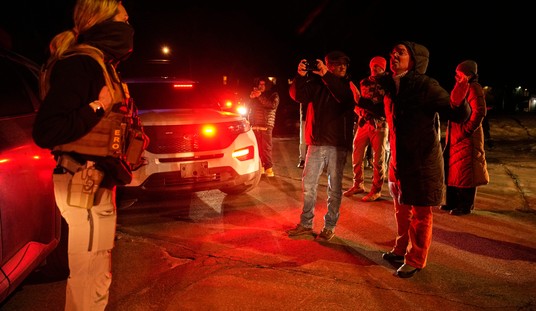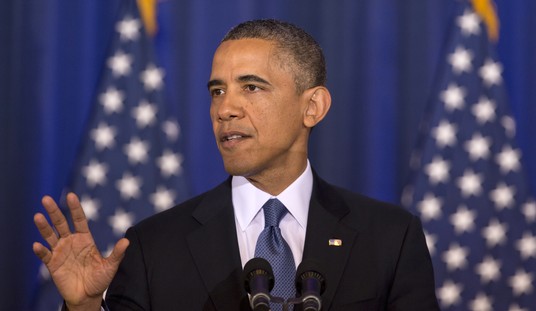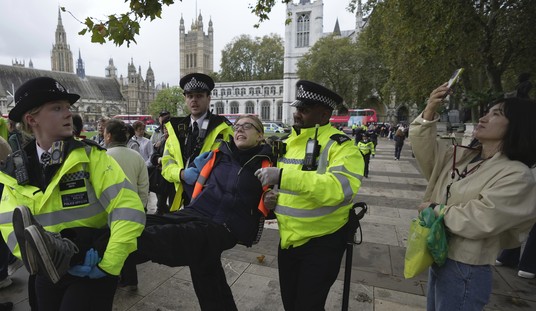Last April, I stopped briefly in Philadelphia to deliver a short paper at the Philadelphia Society’s 43rd National Meeting. The general topic was “Challenges to Conservatism.” (I, too, have a hard time believing they managed to get to the bottom of that list in a day and a half.) My panel was devoted to the theme of “Globalization,” which, depending on how you look at things, I suppose might be regarded as a challenge of or a challenge to conservatism. In any event, I was asked to say a few words about “multiculturalism,” that university-nurtured version of cultural relativism that has now firmly ensconced itself wherever politically correct college-educated elites congregate, which is to say just about everywhere.
I won’t rehearse my brief against multiculturalism here. But I would like to observe that it seems to me that perhaps the most pressing “challenge to conservatism” today is the failure of liberalism. That may sound paradoxical. It isn’t. Russell Kirk once said that he was conservative because he was a liberal. Of course, the liberalism Kirk had in mind was not the rancid leftism that today congregates under and betrays the name of liberalism but rather the robust classical liberalism espoused, for example, by Edmund Burke–liberalism, so to say, abundantly endowed with red corpuscles.
In this sense, multiculturalism is not so much an expression of liberalism as a symptom of a characteristic disease or antinomy of liberalism. The antinomy is this: liberalism implies openness to other points of view, even (it would seem) those points of view whose success would destroy liberalism. Extending tolerance to those points of view is a prescription for suicide. But intolerance betrays the fundamental premise of liberalism, namely, openness. Damned if you do, damned if you don’t.
As I have argued earlier in this space, the escape from that antinomy lies in understanding that “tolerance” and “openness” must be limited by positive values if they are not to be vacuous. American democracy, for example, affords its citizens great latitude, but great latitude is not synonymous with the proposition that “anything goes.” Far from it. Our society, like every society, is founded on particular positive values–the rule of law, for example, as well as respect for the individual, religious freedom, and the separation of church and state.
I thought about all this when casting my over a column by Ian Buruma called “The Strange Death of Multiculturalism”. Anyone familiar with Buruma’s work will not be surprised to learn that he is a darling of such organs as The New York Times Book Review and The New York Review of Books. And it is simply delicious that Mr. Buruma, in addition to his many other plaudits, should be “professor of human rights, democracy, and new-media studies” at–it seems too good to be true, but it is true–Bard College. Would that Randall Jarrell were with us today to write a sequel to Pictures from an Institution. A professor of “human rights, democracy, and new-media studies” at Bard College would be something irresistible.
Mr. Buruma’s great attraction is his unmovable tenancy in the middle of the road. He is the living instantiation of Hazlitt’s “commonplace critic,” who searches for truth “in the middle, between the extremes of right and wrong.” On the subject of multiculturalism, for example, Mr. Buruma says of course we don’t want mad Mullahs padding about blowing up buildings, beheading journalists, etc. But at the same time, “If we antagonize Europe’s Muslims” too much, they might become even worse. Much better to–well, I was going to say “live and learn,” but that isn’t quite right: much better to frown a little but learn or relearn the virtue of tolerance to love the little bit of Muslim that’s buried in us all. This, I suppose, is one reason he has been so contemptuous of Ayaan Hirsi Ali, the Somali-born writer and former Dutch politician who has been subject to death threats for criticizing Islam. We must, Mr. Buruma suggests, “weigh our words with care. We should distinguish carefully between different kinds of Islam, and not confuse violent revolutionary movements with mere religious orthodoxy.” Really, he thinks, a large part of the problem is us: us Westerners trying to foist of what are after all only our values on other people:
The trouble today is that Enlightenment values are sometimes used in a very dogmatic way against Muslims. They have become in fact a form of nationalism – “our values” have been set against “their values.” The reason for defending Enlightenment values is that they are based on good ideas, and not because they are “our culture.”
There may be plenty of things to criticize about Enlightenment thinking. As the philosopher David Stove once observed, “Enlightened opinions are always superficial.” But let’s leave that to one side here and ponder the dichotomy Mr. Buruma presents: “our values” vs. “their values.” Let’s see, on our side we have:
– political, economic, and religious liberty
– full citizenship for women
– separation of church and state
– freedom of inquiry
– embrace of the free market as an engine of wealth
Etc.
On their side we have:
– absolute submission to the will of Allah
– religious intolerance
– servitude of women
– barbaric ritual punishments for crime
– recourse to suicide bombers as an instruments of policy
Etc.
Pace Mr. Buruma, I think that part of what makes “our culture” ours are the customs, values, and practices that have defined it. Some of those values are “Enlightenment values,” some long predate and even conflict with Enlightenment values. But we subscribe to it not because of any abstract inventory of merit but, on the contrary, because it is ours.
Every so often, Mr. Buruma flickers into focus as hard-headed realist: after all, this is the way things are, and if we want to succeed, we just have to suck it up and go along:
Whether Europeans like it or not, Muslims are part of Europe. Many will not abandon their religion, so Europeans must learn to live with them and with Islam. Of course, this will be easier if Muslims come to believe that the system also works to their benefit. Liberal democracy and Islam are reconcilable. Indonesia’s current political transition from dictatorship to democracy, although no unqualified success, shows that this is achievable.
Even if all of Europe’s Muslims were Islamists – which is a far cry from reality – they could not threaten the Continent’s sovereignty and, by the same token, its laws and Enlightenment values. Of course, there are groups to which Islamism appeals. The children of immigrants, born in Europe, sense they are not fully accepted in the country where they grew up, but neither do they feel a special bond with their parent’s native country. Islamism, besides offering them an answer to the question why they do not feel happy with the way they live, gives them a sense of their self-worth and a great cause to die for.
In the end, the only thing that can truly damage European values is Europe’s response to its non-Muslim majority. Fear of Islam and of immigrants could lead to the adoption of non-liberal laws. By defending Enlightenment values in a dogmatic way Europeans will be the ones who undermine them.
Where to begin? Many Muslims will not abandon their religion, so . . . So we have to capitulate? So we should look forward to a Muslim Europe? Are Islam and liberal democracy “reconcilable”? Are you convinced by the example of Indonesia? What then of Iran, Afghanistan, Saudi Arabia, Somolia, etc., etc.? “Even if all of Europe’s Muslims were Islamists . . . they could not threaten the Continent’s sovereignty and, by the same token, its laws and Enlightenment values.” Hello? Earth to Ian: come in please! And as for the idea that “the only thing that can truly damage European values is Europe’s response to its non-Muslim majority,” tell that to Theo van Gogh, tell it to the victims of London’s subway bombing, tell it to the victims of the train bombing in Madrid.
Mr. Buruma ends by pleading that “We must do everything to encourage Europe’s Muslim to become assimilated in European societies.” (”It is,” he says, “our only hope.”) I agree. But what Mr. Buruma argues for is not the assimilation of Muslims into European culture but the melding of European and Muslim culture, a far different proposition.
Mr. Buruma dusts off and updates the old “better Red than dead” philosophy that animated many left-winger in the Cold War. Sure, we in the West “must defend our freedoms against the holy warriors who seek to destroy them,” he says in another column. “But we must also be careful that in doing so we don’t end up undermining them ourselves. In the balance between security and civil liberty, the latter should never be sacrificed to the former.” The chorus asks: What never? Tell that to Abraham Lincoln, FDR, or Winston Churchill. Civil liberties are precious; but it is sanctimonious flapdoodle to pretend that they “should never be sacrificed” to security.
The case of Mr. Buruma illustrates an important point: That the “openness” that liberal society rightly cherishes is not a vacuous openness to all points of view: it is not “value neutral.” It need not, indeed it cannot, say Yes to all comers, to the Islamofascist who after all has his point of view, just as much as the soccer mom, who has hers. Western democratic society is rooted in a particular vision of what Aristotle called “the good for man.” The question is: Do we, as a society, still have confidence in the animating values of the vision? Do we possess the requisite will to defend them? Or was Jean François Revel right when he said that “Democratic civilization is the first in history to blame itself because another power is trying to destroy it”? The jury is still out on those questions. How they are answered will determine the future not only of Western universities but also of that astonishing spiritual-political experiment that is Western democratic liberalism.









Join the conversation as a VIP Member